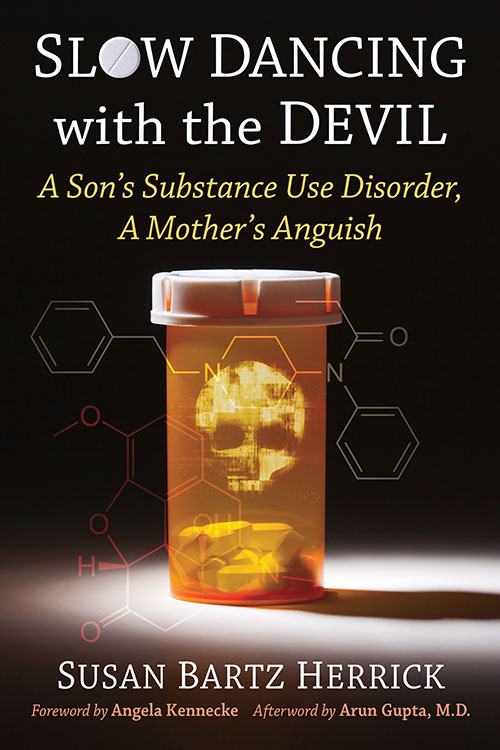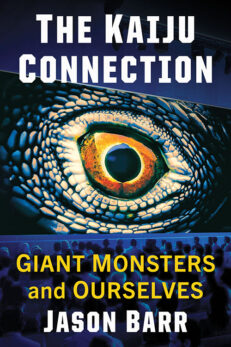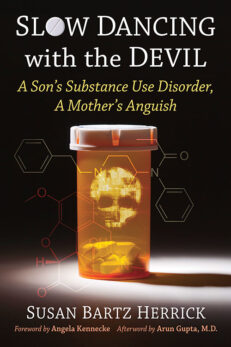Slow Dancing with the Devil
A Son’s Substance Use Disorder, A Mother’s Anguish
$29.95
In stock
About the Book
Susan Herrick’s memoir follows the story of her beloved son and only child, Luke, through his struggle with opioid addiction, recovery and sobriety, and untimely and heartbreaking death. Luke suffered a near-fatal car accident that left him partially paralyzed and addicted to Oxycontin, the very drug that helped save his life. Susan turned to the streets to obtain Suboxone, a legal but medically restricted opioid blocker, in an attempt to save her son’s life. Remembering this, she writes, “The day I became my son’s drug dealer, we both died, in a way.”
This poignant and compelling memoir exposes the rampant prescribing of Oxycontin, upwards of 600mg daily in cases like Luke’s, and the role overprescribing plays in the disease of Substance Use Disorder (SUD). Through Luke’s story, the author addresses failed public policies, misguided medical practices, societal stigmas, and enabling tendencies of loved ones that hinder recovery for those afflicted with SUD.
About the Author(s)
Bibliographic Details
Susan Bartz Herrick
Foreword by Angela Kennecke
Afterword by Arun Gupta, M.D.
Format: softcover (6 x 9)
Pages: 283
Bibliographic Info: 24 photos, notes, bibliography, index
Copyright Date: 2024
pISBN: 978-1-4766-9389-7
eISBN: 978-1-4766-5155-2
Imprint: Exposit
Table of Contents
Foreword by Angela Kennecke 1
Preface 3
Chapter 1. Once Upon a Time 5
Chapter 2. The Little White Pill 19
Chapter 3. The Price Tag 39
Chapter 4. Tough Love 65
Chapter 5. The Circle of Life 86
Chapter 6. A New Start 105
Chapter 7. The Unseen Enemy 126
Chapter 8. Broken Policies 154
Chapter 9. The Golden Years 182
Chapter 10. The Perfect Storm 213
Chapter 11. Dying for Change 239
Afterword by Arun Gupta, M.D. 245
Acknowledgments 249
Chapter Notes 253
Bibliography 263
Index 273
Book Reviews & Awards
• “A powerfully written and heartbreaking story of a mother’s love, grit, loss, and ultimate resiliency. In this book, Susan Bartz Herrick relives the emotional rollercoaster of a son who survives a near-fatal car crash only to be ravaged by chronic pain and substance use disorder (SUD). She shares with brutal honesty the challenges and frustrations of a mother trying to navigate a medical system that was incapable of managing the neurobiological complexities of her child. Slow Dancing with the Devil is a book that should be read by every parent, friend, or relative of teens or young adults growing up in the ‘opioid era.’ As Susan eloquently and sadly implores within these pages, we must reframe our opinions and biases in caring for those afflicted with SUD. This compassionate and comprehensive approach is more critical now than ever amid an opioid crisis fueled by the most dangerous drugs ever known to human civilization. This story of tragedy and loss is also a tale of resilience. A strong woman who did not and would not give up. His story lives on as an education for all of us.”—Thomas Buchheit, MD, director of the Regenerative Pain Therapies Program at the Duke Center for Translational Pain Medicine (CTPM)
• “A call for a strategic reset in fighting America’s opioid epidemic. Current policies are counterproductive. This is a classic example of a lack of knowledge & poor outcomes. Currently, SAMHSA reported only 0.4% of all 1,700,000 providers in America take care of 2.4 million that are in treatment. The treatment arm has been criminalized for 22 years; 1000s of doctors have been prosecuted for taking care of these complicated patients. Everyone is frustrated, patients can’t get help, and families left behind are suffering.”—Arun Gupta, MD, author of The Preventable Epidemic: A Frontline Doctor’s Experience and Recommendations to Resolve America’s Opioid Crisis
• “Slow Dancing with the Devil is a book about a mother’s agonizing journey through the opioid epidemic of the 2010s. The book is written with such details, so much so that for readers whose lives or the lives of loved ones’ were touched by the epidemic, the book is a vivid account of their own suffering and the suffering of many American families impacted by the epidemic. For those who have never been impacted directly or indirectly, the book is an intense documentary of the human suffering of those inflicted by the disease of substance use disorders and the unrelenting grief of their families. The book takes the reader on a journey between emotions and facts about the disease, and between hopes and despair of conquering the disease. It is a partially agonizing account of the suffering of a mother’s journey through the epidemic. It is partially educational to tell the truth, and scientifically explain substance use disorders. The book also tells of the unrelenting extent a mother goes in trying to dislodge her son from the jaws of addiction, and through it all, vents a justified rage against the medical and pharmaceutical companies, the medical establishments and institutions, and society in their collective incompetency in the handling of the opioid epidemic. As a father who had, experienced the excoriating grief of loss due to opioids, this book is a memoir written by one mother on behalf of many mothers and fathers like me. It is a factual documentary of this country’s blunder in handling a disease unlike any other disease before or since. The book is a must-read for everybody in this country and a cry to strategize a unified front and approach in combating this disease.”—A. Omar Abubaker, D.M.D, Ph.D., professor and chairman, Department of Oral and Maxillofacial Surgery, VCU School of Dentistry and VCU Medical Center
• “The healthcare community claims that it practices evidence-based medicine, but sadly this is not always the case. Personal biases and profit motives are among the factors that can get in the way of addressing a patient’s needs. This book is an eye opener into the roots and history of the opioid crisis and what still needs to be done to get past it. Read it for understanding, but then don’t let this moving story sit on your bookshelf; give it to a policy maker and implore them to fix the problem.”—Bruce Daggy, PhD, Florida State University.
• “Herrick has written a beautiful tribute honoring her precious Luke, and I was right there with her every step of the journey. She is an amazing storyteller! She brought to life the happy and joyful times as well as the pain and sadness. It is important to remember the happy memories and fun adventures!”—Dr. Jamie McManus, MD FAAFP, chair, Medical Affairs, Shaklee Corporation


 Susan Bartz Herrick, MFA, EdD., is a retired professor at UNC-Fayetteville, St. Andrews University, and Methodist University. Early in her career, she was a Community Liaison Specialist at HCA Cumberland Psychiatric Hospital and Treatment Center, giving seminars on Mental Health Disorders and Addiction.
Susan Bartz Herrick, MFA, EdD., is a retired professor at UNC-Fayetteville, St. Andrews University, and Methodist University. Early in her career, she was a Community Liaison Specialist at HCA Cumberland Psychiatric Hospital and Treatment Center, giving seminars on Mental Health Disorders and Addiction.


